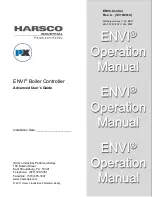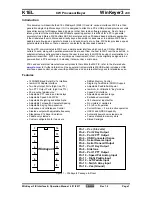
5
2.3. THEORY OF OPERATION
These units regulate AC voltage by automatically
adjusting POWERSTAT
®
Variable Transformers to
maintain constant output voltage.
Each of the three solid-state control units detects one
line to neutral output voltages and continually
compares it with output and accuracy settings selected
by the user. If any line to neutral voltage is out of
specifications, the control unit on that phase drives the
POWERSTAT variable transformer on that phase, by
means of a synchronous motor, to the required new
position.
3.0.
INSTALLATION
3.1. TRANSPORTING THE REGULATOR
Due to its weight and size, proper lifting procedures
must be followed when transporting the unit and
moving it into the location where it is to be installed.
The proper method for moving these units is to place a
forklift under the base. A heavy frame is provided in
this area to allow lifting the unit in this manner without
damage. The 26 inch (559 mm) wide enclosures can
also be lifted by removing the top cover and using the
lifting eyes provided in the sides of the cabinet.
3.2. MECHANICAL INSTALLATION
The voltage regulator is designed for floor mounting.
When mounting the unit, allow a minimum clearance of
4 inches (100 mm) behind the unit for proper
ventilation. All internal components and wiring
connections are accessible through the front panels. A
3 foot (1000 mm) area in front of the unit should be
kept clear for installation and service.
3.3. ELECTRICAL INSTALLATION
All WHR Series voltage regulators are designed to be
hard-wired to the input power and the load using copper
wire. When these units increase low input voltage to
give nominal output voltage, the input current is
substantially higher than the output current. Maximum
rated input and output currents for each unit are given
in the enclosed rating charts. Select a wire size that is
adequate to carry the maximum rated current as
specified by local and national code requirements.
The front panel(s) of the voltage regulator must be
removed to allow access to the input and load
terminals. To remove a panel, use a flat blade
screwdriver to release the ¼ turn fasteners, which hold
the front panel in place, and lift the panel off the base.
A full range of knockouts are provided in the base and
the rear panel of the unit for wire entry and exit.
The location of the power connections varies
depending on the options provided. On units with an
input circuit breaker, input connections are made
directly to the circuit breaker. On units without any
options, the input connections are located on the
POWERSTAT variable transformer. The input power
connections are labeled L1, L2, and L3 for the three hot
lines. Load connections are labeled T1, T2, and T3 for
the hot lines and are made to the POWERSTAT
variable transformer on units without any options.
In some cases the unit consists of more then one
enclosure. In these cases each enclosure will be
labeled “L” for input and “T” for output. In installing
multiple enclosure units refer to the second page of the
schematic supplied for point to point connections.
The input/output neutral is labeled NEUT. The input
neutral must be connected unless a zig-zag transformer
option is included.
WHR64 and WHR94 series have a zig-zag or neutral
generating transformer included.
The input neutral
MUST NOT be connected to either of these series
units.
The transformer in the WHR64 series is for
internal use only and no external neutral should be
connected. The zig-zag transformer in a WHR94 series
is designed to support the full rated output neutral of
the unit.
The ground terminals are a ground stud on the cabinet
wall, or a lug on the base, and must be connected to a
suitable earth ground to reduce the chance of electrical
shock.
4.0.
START UP
Set the Output Voltage Range toggle switch on each
control module to either the 380Y/220 or the 480Y/277-
volt position to match your application. Use the
380Y/220-volt position for 400Y/230 and 415Y/240-volt
systems. The Output Voltage Adjustment and the
Sensitivity potentiometers are set at the factory for
nominal output voltage and approximately 2%
accuracy, and should not be readjusted until the
voltage regulator is initially energized.
After all input and output connections are completed
and checked, place the front panel(s) in position and
tighten the fasteners.
Energize the regulator power source and, if provided,
place the voltage regulator's circuit breaker in the "ON"
position. The voltmeter should indicate the output
voltage (approx. 400Y/230 or 460Y/ 266 volts), and the
POWER pilot lamps and the CONTROL pilot lamps
should be lit. This indicates the voltage regulator is
operating properly.
Содержание STABILINE WHR34 T Series
Страница 2: ...2 ...
Страница 16: ...16 11 0 SCHEMATIC For reference only use full size supplied with unit ...
Страница 17: ...17 12 0 FLOOR MOUNT DIMENSIONS Enclosures A through G Note All dimensions are inches millimeters ...
Страница 18: ...18 Enclosures A through G continues Note All dimensions are inches millimeters ...
Страница 19: ...19 Enclosures A through G continues Note All dimensions are inches millimeters ...
Страница 20: ...20 Enclosures DPLUS through GPLUS Note All dimensions are inches millimeters ...
Страница 21: ...21 Enclosures DPLUS through GPLUS continues Note All dimensions are inches millimeters ...
Страница 22: ...22 Enclosures DD through GG Note All dimensions are inches millimeters ...
Страница 23: ...23 Enclosures DD through GG continues Note All dimensions are inches millimeters ...
Страница 24: ...24 Enclosures EEE through GGG Note All dimensions are inches millimeters ...
Страница 25: ...25 Enclosures EEE through GGG continues Note All dimensions are inches millimeters ...






































